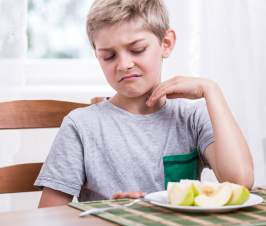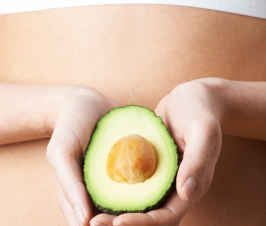It can be really confusing to navigate the world of nutrition with so many theories and approaches out there, not to mention experts and research that seem to contradict each other. For many of us, feeling overwhelmed by information can lead to confusion or just plain giving up on our nutrition goals. There is a simpler way to approach this!
What if you were to shift your focus from specific foods to eat or and avoid to having a more general approach? What if you only had to answer one question when it comes to eating? That would create much more ease and clarity when it comes to nourishing your body.
The answer is this: when in doubt, go dense. What I mean by that is choosing nutrient dense foods, rather than foods that are nutrient-depleted (or refined), will guarantee you’re always making the right choice for you. Foods that are closer to their natural state tend to be more replete in vitamins and minerals and tend to have a better balance of macronutrients (like protein, fat and fiber). The more foods are altered by humans, the more nutrition we lose.
Processes that expose foods to high levels of heat, light or oxygen cause the greatest nutrient loss. This would include canning, baking, milling (making flour) and blanching. Water-soluble vitamins like C and B vitamins are particularly sensitive to high temperatures. Grains such as wheat can be ground to remove the fibrous husks. The husks contain most of the plant’s dietary fiber, B vitamins, essential fats, phytochemicals and some minerals. It is impossible to add back everything that is taken out, especially the phytochemicals, even with artificial fortification.
Other factors like how a food is grown/raised can seriously affect its micronutrient content. In 2008, a meta-analysis was published that looked at over 100 studies looking at the nutrient value of organic vs. conventionally farmed foods. Overall, organic foods were found to be higher in polyphenols, antioxidants (including vitamin C), nitrates and protein. The study concluded that common conventional agriculture practices like reduced pest pressure from pesticides, higher nitrogen levels from soil additives and rapid plant growth from fertilizers reduce plant nutrient production, especially antioxidants.
USDA trend data on garden crops from 1950-1999 demonstrate a decline in protein, calcium, phosphorus, iron, vitamin A, riboflavin and vitamin C of between 5% and 35%. Similar declines are seen in both corn and soybeans – the feed for many animals in the American diet. Given these well-documented declines in addition to the nutritional deficiencies found in human testing samples, even moderately more nutrient-dense foods are a desirable addition to the American diet.
There are simple shifts you can make in where you buy your food and what you choose to eat. Buying local, fresh food is more nutrient dense as most produce loses 30 percent of nutrients three days after harvest. Because most nutrients tend to lie close to the skin surface, washing produce instead of peeling it can mean a huge increase in a vegetable’s nutrient value. Making foods at home allows you to choose which ingredients you include, like using cacao powder, coconut milk and maple syrup for hot chocolate instead of Swiss Miss. Taking a closer look at your diet, you’ll be surprised to discover simple substitutions that are delicious. For example, chia pudding or super-packed smoothies instead of cereal. Letting go of flour and flour-based products (think bread, crackers, cookies) will go a long way to boosting the nutrient density of your food. Dip cucumbers and carrots instead of chips into your guacamole or eggs with black beans, greens and roasted sweet potato instead of toast.
With a little curiosity and creativity, you can significantly increase the quality of your diet while not sacrificing on fun, variety and ease.
Reference:
Benbrook C et al: New Evidence Confirms the Nutritional Superiority of Plant-Based Organic Foods, March 2008. The Organic Center Web site. http://www.organic-center.org/reportfiles/5367_Nutrient_Content_SSR_FINAL_V2.pdf. Accessed July 12, 2008.

Nicola Dehlinger, ND, graduated from SCNM in 2004. Dr Nicola sees clients from around the world in her naturopathic medical practice, Pura Vida Natural Healthcare, in Durango, CO. She is an expert in the treatment of anxiety, depression, and insomnia. She is able to minimize supplements and medications as her patients become empowered to heal themselves. In addition to seeing clients, Dr Nicola leads group and private retreats. She also teaches a variety of online and in-person classes. In her free time, you can find Dr Nicola in the mountains or the kitchen, enjoying time with her husband, son, and their dogs. Website: www.puravidahealthcare.com

















